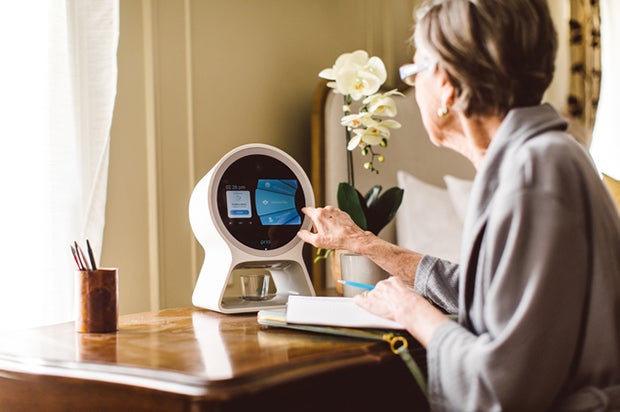

Innovative Devices Engage Patients in Their Health — at Home and on the Run

Technology is helping consumers engage with their health as never before, opening new avenues to promote wellness and help them comply with their doctors’ orders. Two recent examples: a companion robot to help consumers — particularly the elderly — with medication adherence and wireless earbuds that connect to a voice assistant to monitor things like distance run and calories burned.
In the rapidly growing robot assistant market, home products giant Black & Decker has teamed with Pillo Health to launch Pria.
This voice-command device can schedule as many as 28 medication doses, provide alerts and dispense proper dosages. It includes a built-in camera and uses facial recognition and artificial intelligence to maintain security while sharing information through a mobile app that can be monitored remotely by a caregiver. It retails for $750, which includes a one-year subscription through Black & Decker’s website; thereafter subscribers pay a $10 monthly fee to gain access to mobile apps, video calls and check-ins for caregivers.
As with many pill dispenser systems, Pria’s distributors tout the peace of mind the system offers to users and loved ones who care for them, noting that the device is part of smart home devices to help seniors live more independently. But the device goes a step further in enabling caregivers to place a video call into the home through an app and schedule remote reminders or check-ins that Pria can deliver on their behalf, notes a FierceHealthcare report.
Black & Decker is a financial backer of Pillo Health and will handle sales and distribution of Pria, which the tech company first announced at a conference last year. Pillo Health will market Pria to health care providers and other organizations focused on improving the health and wellness of patients at home. Still to be answered, however, is when or if information captured through Pria and its app can integrate with electronic health records to aid providers with such things as improving care coordination and patient monitoring.
Also trying to capitalize on today’s more health-conscious consumers, Amazon reportedly is developing a new pair of Alexa-powered wireless earbuds that double as a fitness-tracking device. Named Puget, the earbuds are expected to include a built-in accelerometer to monitor activities like distance run, calories burned and running pace, CNBC recently reported, citing an unnamed source directly involved in the project.
While this may be a small step for Amazon, it could signal the company’s desire to develop other products to help patients better manage their health. The Alexa access angle fits with Amazon’s strategy to place the voice-assistant in locations beyond the home. The report notes that the earbuds support talking to the voice assistant outdoors. Consumers will need an Apple or Android phone to use the earbuds, because they don’t include built-in cellular connectivity.



